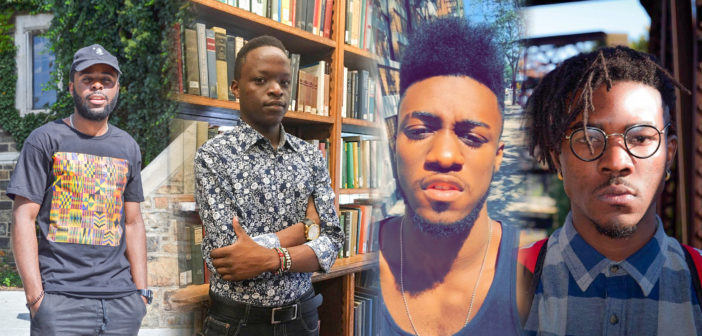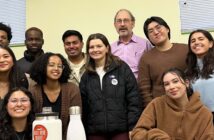Students from across the globe represent 78 countries at Lehigh. The “Lehigh Worldwide” series introduces some of these students, grouped by continent or region, and their experiences in the United States.
Samuel Uko, ’18, of Nigeria, Victor Kiplangat Yegon, ’20, of Kenya, and Richard Adu-Poku, ’18, and Fred Mawulorm, ’18, of Ghana came to the U.S. in search of a better future and more opportunities.
Q: Why did you decide to come to the U.S. for college?
Samuel Uko: Basically, I came for a brighter future and there’s this thing called the “American dream” that everyone talks about and everyone knows it, not just Americans. I feel like there’s more opportunity. Back home there’s opportunity, but you have to go through a lot of obstacles with the education system. Here, they actually let you practice and get more hands-on (experience), where back home everything’s just more like study, study and you don’t really get to do much hands-on.
Victor Kiplangat Yegon: Back home, they do not have a strong emphasis on liberal arts, and I wanted a liberal arts education so I decided to apply to college in the U.S.
Richard Adu-Poku: I was actually born in the U.S. I lived here for three or four years then moved back to Ghana because my parents decided to move permanently. I went to high school in Ghana, but I decided college in America would be the best choice for me, so I decided to come back for college.
Fred Mawulorm: I moved here almost six years ago to live with my mom, and I’ve been here since then.
Q: How did you find out about Lehigh, and why did you choose to attend here over other institutions?
SU: My older sister actually went here, too. She graduated in 2014, just when I was getting in, and she loved Lehigh so much that she wanted me to come. My little sister is here too — she’s a sophomore. Personally, I wanted a smaller school, but I also wanted a social life and academic life. I also applied early decision, and they gave me a really good financial aid package. I mean, Lehigh is in the top 50 schools in the country, so I thought I made a good decision.
VKY: I have friends who’ve gone here before, and they were really helpful in trying to help me narrow down the schools. I came to Lehigh because although it’s not a big liberal arts school, my friends have gone here and have done well, and they told me that, regardless, there was still a lot of emphasis on liberal arts and that it would be a great school to apply to, and I got accepted.
RAP: My high school college adviser spoke about Lehigh and how it had good engineering and business schools. I was interested in doing business, so I researched more and saw that Lehigh’s business school was coming up and that it was good. I also like the location because it’s not far from New York, Philadelphia and New Jersey, so it’s in a good spot.
FM: Originally, since I’m into fashion and arts, I was thinking of going to school in California. My brother told me to check out Lehigh. He said it’s a great school and has a great program, so I applied and, honestly speaking, Lehigh was kind enough to give me a lot of financial aid, which kind of impacted my decision in coming here.
Q: What are some of the biggest culture shocks you have experienced while attending Lehigh?
SU: The sense of individualism. Back home, everything is family-oriented, people spend a lot of time with their family. (They’re) really invested in your business, which can be kind of annoying sometimes, but I feel like it’s to let you know that family is important. But in America, everything is different. Everyone’s like, “You gotta do this yourself, you gotta work for it.” Also the weather — it doesn’t get super cold in Nigeria.
VKY: I feel like here there is a double standard about personal spaces and personal relationships. You find that there’s an emphasis on those and a respect of personal spaces, but at the same time people do not really get that. And for personal relationships, people want to know about you, but at the same time, they don’t really want to know about you. They try to show they care, but deep down it’s not like they really care. I wouldn’t say it’s a culture shock but it’s the culture of the West. I kind of knew this from the movies. It is not hard for me to make friends because I’m an outgoing person, I talk to people, I let people know what I think about things. But it’s the dynamic of the country itself, of the people here. Where I am from, it’s really a close-knit society and you tend to get to know people who you are actually close to deeply, rather than just on the surface. From watching the movies, you think that’s what’s actually happening, getting to know people deeply, but you get here and that’s not the case.
RAP: The low number of African-American students — I didn’t research enough on diversity, so that was one of the things I was really surprised about. Coming from Ghana, most of the students were black or African, so it was kind of different for me.
FM: Diversity. I just came to realize that the blacks and whites are not really one — that’s the honest truth. Coming from a place like Ghana and not really living with these type of people — because Ghana is just straight up African people — so coming in here and seeing that type of division and separation at Lehigh shocked me. The food was also a shock to me. Weather was also a shock to me. But besides that, the separation within social life and the division on campus is the biggest thing.
Q: Is it difficult being away from home?
SU: Not really, because I already have family here. My older brother was the first one to move here, almost 10 years ago. My dad’s brother lives in Virginia, and that’s basically like our home. So it was kind of easier for me to fit in because my sister went here and my mom’s family members also are here. But I know for some people I’ve talked to, it was probably harder for them. I can definitely understand them because they probably don’t have any family here.
VKY: Yeah, it’s difficult being away from home. Last year, I thought I was going to have a great year — I mean, I did have a great year, but after the first month, after you’re done riding the wave of getting here and getting into a good school, then reality hits. You have to do your work well, I have to run well — all that pressure, and I still didn’t know how to let people know about all the pressure. I felt like being under that pressure, I started to feel homesick a lot. Then winter came and it was just crazy. It was really hard the first semester, but second semester was a bit better, and right now I’m used to it.
RAP: Initially it was, but I think after my first year I kind of got used to it. Because I went to a boarding school, being away from my parents, I kind of got used to that. But with the food and the weather sometimes it was a hard adjustment.
FM: It’s not really been difficult, but I just miss home. Ghana is where the heart is, regardless. That’s where my culture is and sometimes I feel like just getting to be and live with my people and having that experience with my people is something I miss a lot. The people back in Ghana are completely different from the people here and you can really relate to people that are from your home, the people you’ve migrated to come live with. Coming to Lehigh and finding a couple of people that were also Ghanaian was something that I really enjoyed because I missed home.
Q: What do you miss most about home?
SU: The culture and the food. The food is so nice, it’s really spicy and I like spicy food. And being with some of the people you grew up with, friends, and the luxury basically of being used to things that you’re familiar with. But I’d say I’m pretty fine, I’ve been here long enough. The food especially, though, it’s hard, but my mom and my sister come and cook spicy food, so it’s cool.
VKY: Hands down the food. And the people and the relationships we cultivate with people. You get to know people and you get deep.
RAP: Honestly, the weather is great throughout, it’s always like 80s, 90s, 70s. It never gets extremely hot even though it’s hot, and it’s never too cold. It’s always kind of perfect. And the food. Eating Sodexo, it was hard doing that all the time. Homemade food is perfect.
FM: I didn’t just come to college here. I moved here and went to high school here for a little bit, so it’s been a really long time since I’ve been home. Just the people, the tradition and the culture are some things that I miss a lot.
Q: What do you do to make yourself feel at home here?
SU: When I initially got here, I thought that there were zero Nigerians and zero African ethnicity people here, but later in freshman and sophomore year, I got to find out that there’s a lot. So mingling with those people and keeping a really close friend group and hanging around with them makes you feel like you’re not alone and that you have people to lean on. I’ve met 10 Nigerians here, and especially in the Lehigh area you would not expect that, so I was pretty impressed. That’s what makes me feel more at home — talking to those people because they can relate to you. Even the ones who were born here — once you’re born into a Nigerian family, no matter where you are — you can never lose that. So it’s been really cool interacting with people like that.
VKY: Cook Kenyan food. I have a friend from home, his name is Jasper, so once in awhile we cook food and chill out and talk Swahili and Kalenjin, which are our languages from back home.
RAP: Surrounding myself with students just like me. Even though I have a lot of friends who are not like me or look like me, my closest, most trusted friends are people who have the same experiences. So that was having a good foundation when I came to Lehigh, having friends like that.
FM: I’m a very, very outgoing person. I like to have conversations with people, and as a result, I have established relationships with all types of people on campus, be it black, be it white, be it African. I do my best to get in contact with people, make friends and get to know people well, so that’s one thing that’s really helped a lot. I have diverse friends and I’ve been learning from each one of them. I like to go out there and get to know people by sharing ideas and culture.
Q: What do you like most about the U.S. and Lehigh?
SU: (In) the U.S., I feel like the opportunity, you can do what you want. There’s a lot of leisure space to thrive and invent, be yourself and be creative. You can come up with cool ideas and actually carry it out, like my fashion line…I feel like the knowledge you get here and freeing yourself and doing what you love and no one to tell you that you can’t do it. Lehigh has been really influential with that, giving us a lot of resources to do it because there are so many people we can talk to and make connections with.
VKY: The diversity part. I’m not sure if Lehigh is diverse enough, but I like the U.S. because it’s diverse. What I like about Lehigh is the academics.
RAP: A lot of people are open minded here. You get the chance to explore and meet a lot of different people from all over the world. Lehigh gives you the chance to meet a lot of intelligent people and people with different cultures. Lehigh is also a pretty good school in terms of getting jobs and exposing you to the job sector.
FM: The very important thing I like about the U.S. is the ability to explore any kind of talents you have and being able to flourish as a result of the resources — and the exposure that it gives you in any kind of discipline that you have or that you’re in. If you compare the United States to a place like Ghana, or any country in Africa, not every talent or every endeavor flourishes. Being a choreographer is something that I really want to do in the future. If I was in a place like Ghana, I wouldn’t be thinking of doing such a thing because the professions are very limited. A lot of people are limited to just being a doctor, a lawyer or a pilot — these big high-end jobs. If you’re an individual with a lot of talents, a lot of people doubt you. This country gives you the platform to be able to go into any kind of endeavor or discipline you want to pursue. Lehigh plays a really big role for me because it gives me a platform and an opportunity to be able to pursue what I want to pursue. I’ve changed my major a couple of times, so I’ve been able to dive into anything that felt good for me at that time. If I want to take a different direction in life, there will be resources and platforms for me to be able to succeed in that.
Q: What do you like least about the U.S. and Lehigh?
SU: The one thing I don’t like about Lehigh, this might be controversial, but maybe school spirit and interactions with students. I feel like the student body is not together — there’s the athletics part, there’s the Greek life part, the non-Greek life part and other people. My cousin goes to a state school and you see people coming together and the vibe is crazy, but at Lehigh, after school you hardly see anyone outside. It’s just empty. No one talks to each other from other groups, they just stay with themselves and everyone just sticks to that.
VKY: Hands down the U.S. politics. I’m Kenyan — we have our own issues, we have our own kind of election, and at the moment we’re going through stuff, too. But here it’s the matter of liberal versus conservative and it’s a whole mess. There are a lot of things that go into it. Back home it’s not as, maybe, aggressive as here. And about Lehigh, the relationships you build with people are sometimes kind of really surface level. And the diversity — I kind of know the black people around, but Lehigh is not at all diverse, and that’s what I like the least about it.
RAP: The U.S. could do with a bit more love. There’s a lot of hate in the system right now, and I just feel like the U.S. could be a better place if people don’t think life is all about capitalizing and making money, but also building strong relationships and caring about other people and just being happy. I feel like Lehigh is doing a good job with being diverse, but it could always do better in a sense when it comes to faculty.
FM: For Lehigh, I just feel like there’s no diversity on campus. I live on the west side of campus, and a lot of people will come to Lehigh and never meet people on the west side or do any activities on the west side. One thing that usually goes on at Lehigh is students come in here and are not given the opportunity to explore. There’s an already set path, like “I have to join a sorority,” “I have to join a frat,” “I have to go to parties on East Fifth” or “I have to live on the Hill.” At the end of the day, Lehigh is a whole community all together. Yet there’s an east side and a west side. And if you ask yourself at the end of the four years if you got to explore all the barriers and all the other places that Lehigh has to offer? No. The separation and the structures that are put in place is something I don’t like. People walk around and act like they don’t know you even if you had a conversation with them the day before. It’s not cool. Regardless of the effort that Lehigh is trying to put into promoting diversity, the individuals and structures that are in place don’t really promote diversity on campus. About the U.S., just the things that go on on the daily. I’m from a country where no human being will ever take a gun and shoot a fellow human being. There’s none of that there. It’s not until you get into this country that you know the reality. There’s no love, it’s always hatred. Where I’m from it’s all love, everyone is one, there’s no such thing as crazy violence or any of that. You always wake up happy.






Comment policy
Comments posted to The Brown and White website are reviewed by a moderator before being approved. Incendiary speech or harassing language, including comments targeted at individuals, may be deemed unacceptable and not published. Spam and other soliciting will also be declined.
The Brown and White also reserves the right to not publish entirely anonymous comments.
1 Comment
Always interesting to read the impressions of foreigners concerning the USA. Sometimes political correctness prevents US citizens from writing or voicing the same impressions concerning our country.